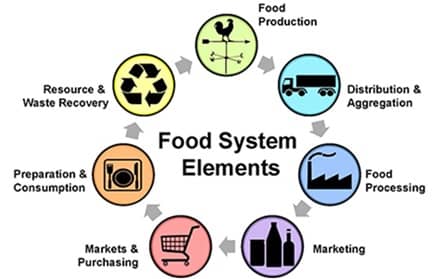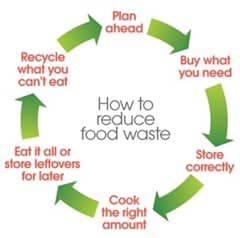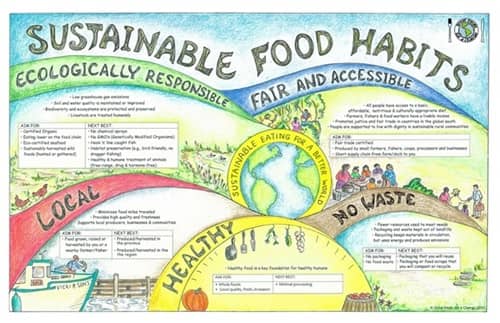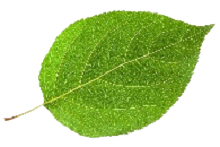Sustainable Food Systems = Sustainable Lifestyle
What We Eat Impacts The Planet
Whether you believe in climate change or not, we all have to eat. What we eat has a great impact on the planet. It only takes a small change in our eating habits to have a great impact. This short video (5:39), “The diet that helps fight climate change” succinctly showcases the connection between our well-being and environmental health, and pinpoints deliverable small changes we can make. If not for environmental health, it is worthwhile to change your eating habits for your own well-being!!
Zero Waste - The 5 R's
10 Ways To Reduce Waste | Zero Waste For Beginners
Reduce, Recycle, Repurpose, Regenerate, Refuse
This video is one of many resources on reducing waste. I selected this because its messages integrate all of the CC4ES modules. Additionally, it promotes the ecosia.org search engine. Ecosia plants trees globally from your online searches – check it out.
Understanding the scientific basis of zero waste will help cultivate behavioral change for a sustainable lifestyle. I welcome you to read further and take advantage of the resources below to make your own contribution to our global effort.
Food production accounts for 26% of global greenhouse gas emissions. We can make a direct impact simply by being mindful of what we eat. We need to understand two main things for a sustainable lifestyle: how food systems work, and the parallel between our body’s microbial ecosystem and environmental ecosystems.
Grow Your Own Food & Connect With Your Body
Start A Garden
A small patch of garden to grow your own food goes a long way. When we grow our own food, we know what goes into it and we know what we are eating. It teaches us how to be sustainable first hand. In urban settings, gardening also helps us connect with nature.
The Importance Of Urban Farming
55% of the world's population lives in urban areas, a proportion that is projected to reach 68% by 2050. Currently, 80.7% of the US population lives within urban areas. As the world population growth rate outpaces land capable of growing food, it is critical to look into urban farming. Urban gardens connect community members and help build resilient communities. Many urban innovative agriculture technologies are emerging, such as hydroponic and vertical gardens. Urban gardens utilizing regenerative techniques helps us cultivate sustainable eating styles.
Our Body's Ecosystems
Is organic the answer?
Our gut health dictates our overall well-being. This video is rather scientific, but it demonstrates the importance of biodiversity in our gut microbiomes (or ecosystems). Microbes are bacteria that breaks down what we eat so the nutrients can be absorbed. If you want to learn more about microbes, check out the book I contain multitudes by Ed Young listed in the resources below. It will change your perception of microbes, and even learn to appreciate them.
Organic or not? Organic farming means no use of pesticides or synthetic fertilizers. Some foods have more pesticide than others — the dirty dozen (see the link below). Processed foods generally have preservatives and other chemicals which harm our gut ecosystems. It is healthier to eat less processed food. Locally sourced and seasonal food has a shorter shelf-life, can get to your table fresher and provider better nutrients.
The Dirty DozenGut Ecosystems
Your Gut Microbiome: The Most Important Organ You've Never Heard Of
There are other ways to help our gut ecosystems thrive. Practice mindfulness, exercise and connect with others. The book Farmacology by Daphne Smith, M.D. (listed below) explains in plain language the connection between what we eat and our gut ecosystems.
Food System Elements
As shown in the diagram, a food system starts with food production, followed by distribution & aggregation, food processing, marketing, markets & purchasing, preparation & consumption, and finally resource & waste recovery. For individual circles, if we grow our own food, we get to skip several elements. This would save us ecological footprints.
DIY: Think about how you can reduce ecological footprints for each element of the food system. Be creative.

Actions For Sustainable Food Systems
Actions To Reduce Food Waste

- Plan ahead what to buy
- Buy what you need
- Store correctly
- Cook the right amount
- Eat it all or store leftovers for later
- Recycle what you can't eat
Sustainable Food Habits

- Buy food produced by ecologically responsible methods
- Support fair and accessible farms, and local farmers!!!!
- Eat seasonal and locally grown food.
- Minimize food waste
Recommended resources
- Farmacology: Total Health from the Ground Up, by Daphne Smith, M.D.
- I Contain Multitudes: The Microbes Within Us and a Grander View of Life, by Ed Yong
- The Suburban Micro-Farm: Modern Solutions for Busy People, by Amy Stross
Keywords for further exploration
- Organic
- Foodscape
- Food desert
- Permaculture
- Urban Gardening or Agriculture
- probiotic
- microbiomes
